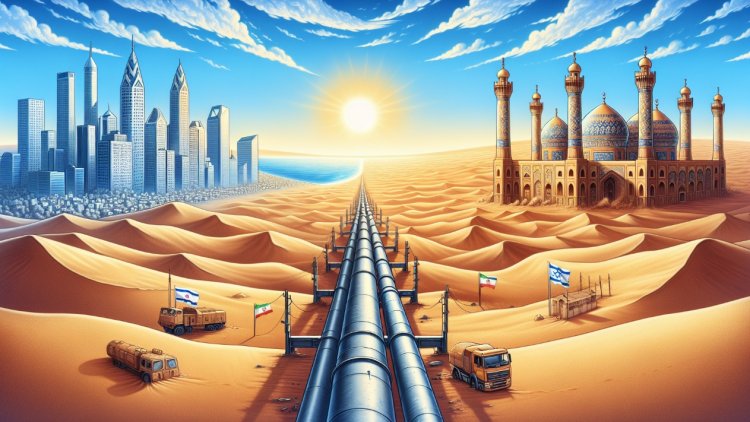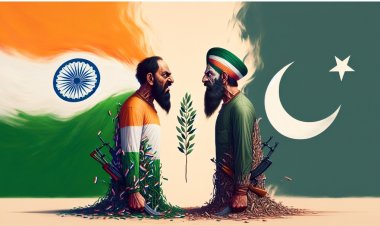The Iranian-Israeli Conflict: Unraveling the Rhetoric and Reality
Unmasking the complexities of the Iranian-Israeli conflict! Go beyond the rhetoric and delve into the historical context, political motivations, and potential pathways toward peace.

Introduction
-
The history of the Israeli-Iranian pipeline dates back to the 1970s when the two countries collaborated to transport crude oil through Israel to Europe.
-
In October 2023, Hamas, an Islamist terror group backed by Iran, carried out a terror attack on Israel, escalating the conflict.
-
The Israeli-Iranian conflict has had a significant impact on the Middle East, with Israel forming a strong alliance with the United States.
Historical Context
-
After Israel declared independence in 1948, Iran was one of the first Muslim-majority countries to recognize the new state.
-
However, Iran's stance shifted dramatically after the 1979 Iranian revolution, which toppled the Western-backed Shah regime.
-
The leader of the Islamic revolution, Ruhollah Khomeini, saw Israel as a problem in the Muslim-majority world, and the Iranian regime has since denied Israel's right to exist.
-
The Iranian regime has used anti-Israel rhetoric and propaganda to gain recognition as a regional power in the Middle East.
-
Iran's denial of Israel's right to exist is evident in public displays, such as the Palestine Square in Tehran, where a clock counts down to the "destruction of Israel" by 2040.
-
It is important to differentiate between rhetoric and reality in understanding Iran's stance towards Israel.
-
Despite the rhetoric, Iran's involvement in a direct military conflict with Israel is unlikely due to its inferior air force compared to Israel's sophisticated planes.
Iran's Geopolitical Strategy
-
Iran's use of anti-Israel rhetoric has played a significant role in shaping its geopolitical strategy in the Middle East.
-
By denying Israel's right to exist and portraying it as a problem in the Muslim-majority world, Iran seeks to gain recognition as a regional power.
Impact of Anti-Israel Rhetoric
-
The Iranian regime has used anti-Israel rhetoric and propaganda to rally support and consolidate power among its population.
-
Public displays, such as the Palestine Square in Tehran, where a clock counts down to the "destruction of Israel," reinforce this rhetoric.
-
However, it is important to differentiate between rhetoric and reality when understanding Iran's stance towards Israel.
-
Despite the strong rhetoric, Iran's inferior air force compared to Israel's sophisticated planes makes direct military conflict unlikely.
Iran as the Leader of the Muslim World
-
The Iranian regime proclaims itself as the leader of the Muslim world, positioning itself as the defender of the weak and the Palestinians.
-
This self-proclaimed role allows Iran to gain recognition and influence among Muslim-majority countries in the region.
-
By formulating a rhetorical campaign that resonates with the average citizen in the Arab Muslim world, Iran seeks to solidify its position as a regional power.
Support for Palestinians
-
Iran's support for Palestinians serves its geopolitical goals by positioning itself as the leading supporter of the Palestinian cause in the Arab world.
-
Through backing proxy armies like Hamas, Hezbollah, and Islamic Jihad, Iran gains influence and leverage in the region.
-
Support for Palestinians also allows Iran to compete with its archenemy, Saudi Arabia, for influence in the Middle East.
-
However, it is essential to recognize that Iran's support for Palestinians is part of a broader geopolitical strategy and may not necessarily reflect popular sentiment within the country.
Proxy Armies and Regional Influence
-
Iran's support for proxy armies such as Hamas, Islamic Jihad, Hezbollah, and the Houthis has played a significant role in shaping its regional influence.
Ideological Similarities
-
These proxy armies share ideological similarities with Iran, particularly in their opposition to Israel and their anti-Western sentiments.
-
Iran sees itself as the leader of the Muslim world and uses its support for these groups to gain recognition and influence in the region.
-
By positioning itself as the leading supporter of the Palestinian cause, Iran competes with its archenemy, Saudi Arabia, for influence in the Middle East.
-
Support for proxy armies like Hamas, Hezbollah, and Islamic Jihad allows Iran to project power and exert influence beyond its borders.
-
However, it is important to recognize that Iran's support for these groups is part of a broader geopolitical strategy and may not necessarily reflect popular sentiment within the country.
-
The Sunni-Shia Divide
-
The conflict between Iran and Israel also reflects the broader Sunni-Shia divide in the Muslim world.
-
Most Muslims in the world, including most Palestinian Muslims, are Sunni, while Iran has a Shia majority.
-
This divide influences regional power dynamics as it shapes alliances and rivalries in the Middle East.
-
Saudi Arabia, a Sunni-majority country and Iran's archenemy is also a significant player in the region and competes with Iran for influence.
-
The recent normalization of diplomatic relations between Israel and Sunni-majority countries such as the United Arab Emirates and Bahrain further complicates the regional dynamics.
Israeli Response and Actions
-
Israel has taken several actions in response to the Iranian threat and its support for proxy armies in the region.
Airstrikes in Syria and Weapons Interception
-
Israel has conducted airstrikes in Syria, targeting weapons shipments to prevent them from reaching Iran's proxy armies, such as Hamas in Gaza and Hezbollah in Lebanon.
-
These airstrikes aim to disrupt the supply chain and weaken the capabilities of Iran's proxies, which pose a threat to Israel's security.
Concerns about Iran's Nuclear Programme
-
Israel has expressed deep concerns about Iran's nuclear program, which it views as a threat to its existence.
-
While Iran claims its nuclear program is for peaceful purposes, Israel, along with other world powers, doubts this claim and believes Iran is pursuing nuclear weapons.
-
Israel has been a vocal critic of the Iran nuclear deal and has implicitly threatened to attack Iran's nuclear facilities.
Sabotage and targeted assassinations
-
Israel is suspected of carrying out acts of sabotage and targeted assassinations against Iranian interests.
-
In 2020, an explosion at the Natanz nuclear facility set back Iran's nuclear program by up to two years, and Israel is believed to be responsible for this and other sabotage attacks.
-
Israeli intelligence agency Mossad has also been linked to targeted assassinations of high-profile Iranian nuclear scientists.
The Role of External Powers
-
US-Israel Alliance The alliance between the United States and Israel has had a significant impact on the Israeli-Iranian conflict. The United States has been Israel's number-one ally, providing military and financial support. This support is based on strategic interests in the Middle East and a common enemy in Iran. The US-Israel alliance has strengthened Israel's position and deterred potential threats from Iran.
-
The Abrahamic Accords The Abraham Accords, a US initiative signed in 2020, aimed to contain Iran's influence in the region by normalizing diplomatic relations between Israel and several Muslim-majority countries. Countries such as the United Arab Emirates and Bahrain, with significant Sunni Muslim populations, established official ties with Israel, breaking away from the traditional animosity towards the Jewish state. These accords further isolated Iran and limited its ability to rally support in the Arab world.
-
The failed Israel-Saudi Arabia deal The United States also attempted to broker a historic agreement between Israel and Saudi Arabia. However, the October 2023 terrorist attack by Hamas on Israel and the subsequent Israeli response put the normalization of relations on hold. This attack and the resulting outrage in the Arab world stalled the progress towards a deal between Israel and Saudi Arabia. The failed deal had significant ramifications for the region, as it could have further isolated Iran and shifted the balance of power in favour of Israel.
The Current Situation and Future Outlook
-
The October 2023 terrorist attack by Hamas, an Islamist group backed by Iran, has had a significant impact on the Israeli-Iranian conflict.
-
The attack escalated the conflict and put it on a whole new level, leading to increased tensions between the two countries.
-
Relations between Iran and Israel have been severely strained as a result of the attack, with Israel declaring war on Hamas and launching retaliatory strikes.
-
The conflict between Iran and Israel has global implications, as both countries are major military powers in the Middle East.
Potential for Direct Involvement of Iran
-
There is a potential for Iran's direct involvement in the conflict, although it is unlikely due to the country's inferior air force compared to Israel's sophisticated planes.
-
Iran may choose to continue supporting its proxy armies, such as Hamas and Hezbollah, to exert influence and project power beyond its borders.
-
Iran's involvement in the conflict could lead to a regional war with far-reaching consequences.
Unresolved Nature of the Conflict
-
The conflict between Iran and Israel remains unresolved, with deep-rooted ideological differences and geopolitical strategies driving the animosity between the two countries.
-
The Iranian regime's denial of Israel's right to exist and its anti-Israel rhetoric continue to fuel the conflict.
-
The conflict has implications for regional power dynamics and alliances, as well as for global security and stability.
Conclusion
After exploring the Iranian-Israeli conflict, we can summarise the main points of this blog. The conflict between Iran and Israel dates back to the Iranian revolution in 1979 when the Iranian regime shifted its stance towards Israel and denied its right to exist. Iran's use of anti-Israel rhetoric and support for proxy armies like Hamas and Hezbollah have played a significant role in shaping its geopolitical strategy in the Middle East. Israel, on the other hand, has responded to the Iranian threat through airstrikes, sabotage, and targeted assassinations. The conflict between these two regional powers has global implications and remains unresolved due to deep-rooted ideological differences and geopolitical strategies.
We invite readers to suggest other geopolitical conflicts they would like us to explore in future blogs. Understanding geopolitical conflicts is crucial for comprehending global politics and their impact on various regions. We value your feedback and engagement, so please feel free to share your thoughts and insights in the comments section.



 admin
admin 










